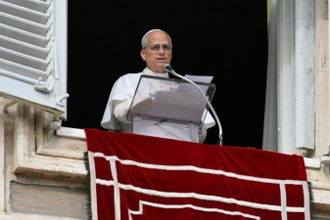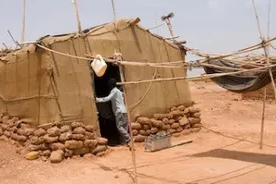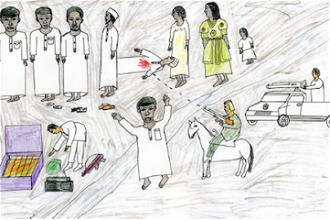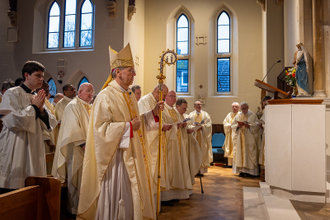South Sudan: Education needed to build peace
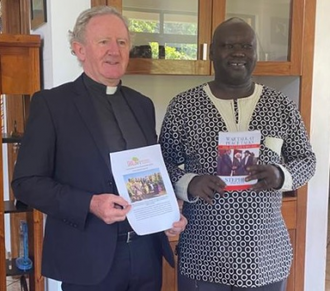
Fr Patrick Devine with Government Minister of Peacebuilding Stephen Par Kuol
A South Sudanese government minister recently expressed optimism on the chances for the successful implementation of the revitalised peace agreement in his troubled country. Stephen Par Kuol, Minister of Peacebuilding, said all parties to the agreement are working to consolidate lasting peace despite the challenges, including communal violence and Covid-19.
Although political violence has largely subsided in South Sudan since the signing of the peace agreement, inter-communal clashes continue to result in the killing and injuring of civilians, cattle rustling and the looting of property. "We are working on proposals on how to address communal violence in many areas in the country" said Minister Par.
"We're developing peace initiatives with the newly appointed governors. We've also made progress in establishing relationships with partners and some influential community leaders in the country" he added.
The minister reiterated the transitional government's commitment to restore peace and stability in South Sudan, saying they will focus more on how to address communal violence after the finalisation of governance structures throughout the country.
The Shalom Center for Conflict Resolution and Reconciliation (Shalom-SCCRR) - founded by Irish missionary, Fr Patrick Devine - has always taken an active role in advocating for peace and educational development in the countries of South Sudan and Sudan. Both countries are members of IGAD - the Intergovernmental Authority on Development - with which Shalom has signed a Memorandum of Understanding.
The progress of any country in meeting basic human needs, governance and the realisation of human rights relies heavily on the progress of education, among other factors. Education is more than just a fundamental right for children all over the world - it is an opportunity that paves the way to a successful and productive future for those who are fortunate to attain it. However, it is noteworthy that education systems cannot be fully insulated from the effects of violence. In most of the African countries, education has consistently and systematically been negatively impacted by cycles of conflicts.
In the case of South Sudan, over two decades of civil war combined with the cumulative effects of years of conflict, political instability and extreme poverty, have tremendously impacted on education systems for generations. According to UNICEF (2020), more than two million children (over 70%) are out of school in there, putting their future and the future of this young country at risk. The vast majority of these children are girls, child soldiers, children with disabilities, and children who are just too hungry, too busy working to help their families, or too afraid to be attacked on their way to or from school.
In a post conflict country, education should be a core element of the peace premium that is normally one of the main priorities for post-conflict reconstruction processes. Education, therefore, has a crucial bearing on prospects of peace, productivity and overall development. The communities in post conflict areas like South Sudan see education as the most important peace dividend. Across South Sudan, demand for education is high and rising. However, without infrastructural development, it will be difficult for the country to generate equitable learning opportunities and economic dynamism needed to build advanced human development and shared prosperity.
Shalom-SCCRR recognises that conflict has a devastating impact on education both in terms of the suffering and psychological impact on learners, teachers, and communities, and on the degradation of the education system and its infrastructure. It is from this background that Shalom-SCCRR has been contributing to post conflict reconstruction in the IGAD countries, including South Sudan, through the implementation of its school educational and development projects. The organisation, therefore, aims at contributing to the enhancement and expansion of learning opportunities for vulnerable children from poor and marginalised communities living in the conflict environments in these countries.
Shalom-SCCRR Educational and Development Projects implemented in South Sudan.
In response to the UN's Sustainable Development Goals for achieving a better and more sustainable future for all, Shalom-SCCRR has been proactive in supporting education in South Sudan since 2011. The organisation has provided teaching, learning and development support to primary, secondary and tertiary institutions. The support has been in the form of renovation and construction of classrooms and standard latrines, installation of solar lighting systems, provision of school furniture (desks, lockers, tables and chairs) and providing support for boarding facilities (beds, mattresses and mosquito nets).
During the past ten years, Shalom-SCCRR has implemented school educational and development projects in South Sudan that is currently directly benefiting over 6,000 learners and teachers in primary, secondary and tertiary institutions of learning, and indirectly benefiting a population of about 30,000 other members of the community.
Construction and renovation of educational facilities
Educational facilities in most of the schools in South Sudan are still insufficient, impoverished state, and some are not even up to the required quality. To contribute to the improvement of this situation Shalom-SCCRR is supporting in the construction and renovation of school facilities - mainly classrooms, toilets and dormitories - just like in other parts of IGAD countries. As a result, there is currently an increase in retention and enrolment of pupils and students in a number of schools being supported. For example, Nadapal / Narus Comboni Mixed Primary School was supported through construction of three classrooms. The classrooms are currently benefiting more than 300 pupils in the upper classes.
Solar Lighting Systems
Most educational institutions in South Sudan are still struggling in terms of lighting systems. To date, Shalom-SCCRR has provided solar lighting systems - solar panels and batteries - to over 10 institutions in South Sudan. As a result of this support, there is currently improved security in these facilities for both learners and teaching staff. Moreover, there has been significant improvement in academic performance in these schools and this has been attributed to the fact that the learners now have ample time to study both in the early morning and late evening hours within the premises.
The Good Shepherd Peace Centre was supported with 204 panels and solar batteries. The Centre is a place for peacebuilding and trauma healing facility for South Sudan. Fr Daniele who oversaw the implementation of the project noted that the solar units are enough to light and provide the power needed to run all the Centre's operations and activities.
Shalom supported St Joseph Girls Secondary School in Gidel with a fully accessorised solar lighting systems installed in their dormitories benefiting over 400 girls. It donated a solar lighting system to a school in Kauda where a total of 715 pupils are benefitting. Over 100 trainees are benefiting at the Teachers Training Institute in Kauda, 670 pupils are benefiting at a primary school in Gidel, and 470 pupils now have solar lighting at a primary school at Lugi.
School furniture
Pupils and students spend an average of eight hours in classrooms. However, if the classrooms are not conducive for learning, for example, inadequate seating amenities, then the level of concentration among the learners is hugely compromised. In the case of South Sudan, most schools do not have enough desks to guarantee conducive learning. As a result, an average of five pupils and students share a desk or sometimes even sit on the ground during learning sessions. In order to contribute to the improvement of the learning environment, Shalom-SCCRR has provided desks, lockers and chairs to these schools. For example, St. Bakhita Girls Secondary School in Narus was provided with 100 lockers and 100 chairs benefitting 248 pupils.
Boarding facilities
Most of the pupils and students attending schools in vulnerable and pastoralist communities in Eastern Africa walk to and from schools every day. The average distance covered by these children to access education is between 12 to 20 kilometres per day. After walking such distance, the children are very exhausted when they reach school and have reduced concentration during classes. Moreover, the roads to and from schools are normally insecure due to high chances of the children being attacked by wildlife or bandits. In addressing these challenges, Shalom-SCCRR is supporting the schools in South Sudan through the provision of boarding facilities in the form of construction of dormitories and the supply of beds and mattresses.
That support not only enables the pupils and students to have good rest and concentrate more in their studies, but also contributes to their safety and improved academic performance. Furthermore, the girls are now remaining in schools and are safe from early school dropout which is attributed mainly to premature pregnancies and forced marriages while living at home. The need to support the girl child is critical. The schools have, therefore, become secure and protective for girls. For example, Shalom - SCCRR supported a girls' secondary school in Narus with 72 beds.
Fr Devine met recently with Stephen Par Kuol, Minister for Peacebuilding in South Sudan to discuss Shalom's work and opportunities for future co-operation. The Minister is the author of War Talk at Peace Talks: Peace under duress in South Sudan which he published in February 2019. The book is a story of war and peace talks that culminated in Agreement on the Conflict Resolution in South Sudan in July 2015 and its final version in September 2018 known as Revitalized Agreement on Conflict Resolution in South Sudan
Education in South Sudan is becoming a means through which people find hope in their lives. Through improvement of school infrastructure and provision of learning and teaching materials, Shalom-SCCRR envisions a better future for the people of South Sudan. The organisation's school educational and development programme continues to contribute to equitable access to formal education through the reconstruction and improvement of education system in this young country.
By being in school, boys from pastoralist communities are saved from the warrior tradition where young men are seen as the strong ones to execute inter-communal attacks and livestock raids. Girls on the other hand, are saved from premature pregnancies and early marriages thereby being empowered to forge a better future where they can actively participate in leadership and formal decision-making in their communities.
Shalom-SCCRR believes in education which empowers communities to be the architects of their own peaceful futures and sustainable development. The organisation's work will not be possible without the continuous support and contributions from donors and friends particularly in the USA, UK-Northern Ireland and the Republic of Ireland.
Donations can be made via https://shalomconflictcenter.org/
Matt Moran is a writer and author based in Cork in the Republic of Ireland. His forthcoming book is 'The Theology of Integral Human Development'.



